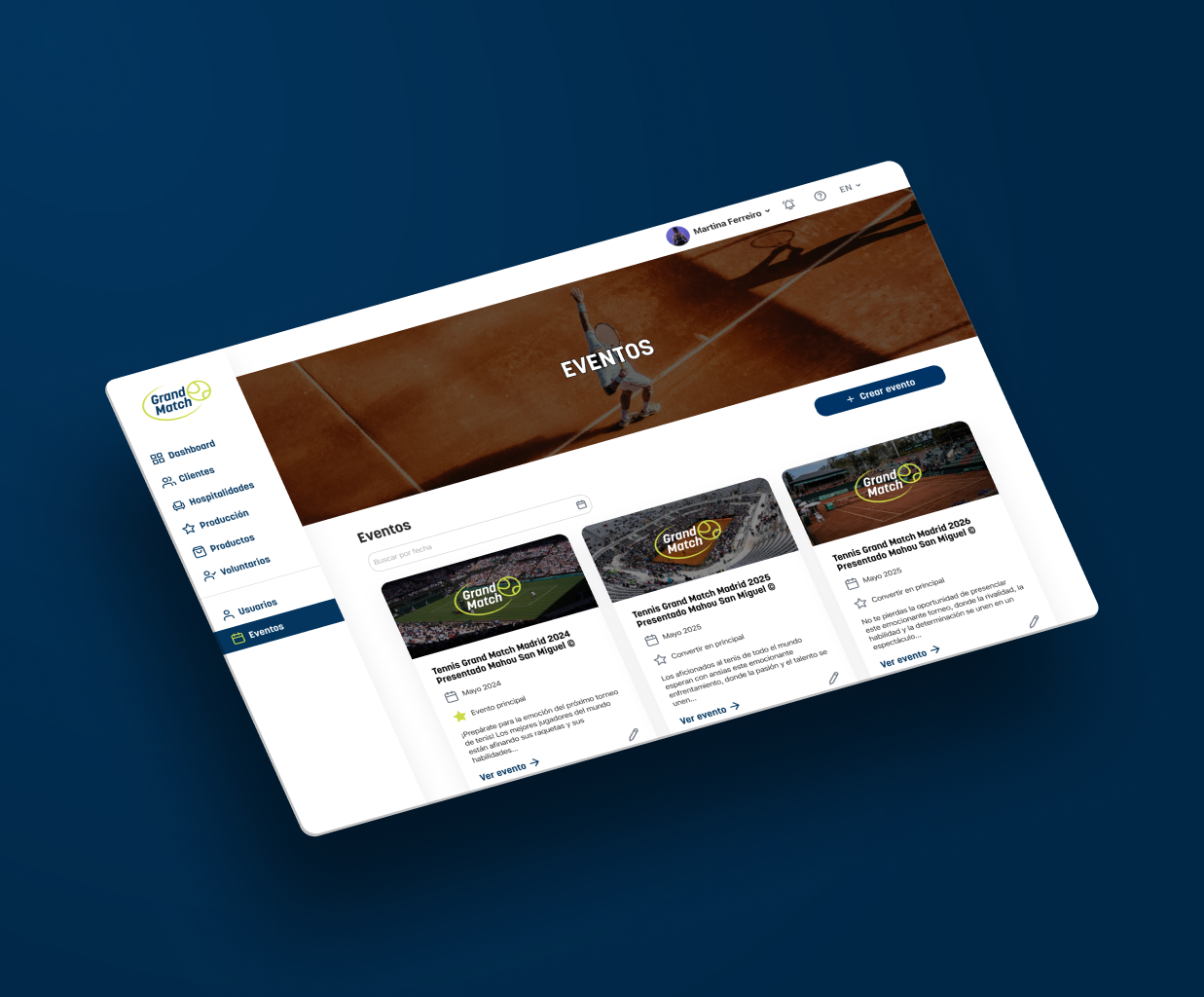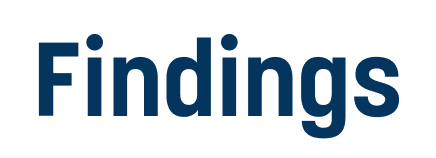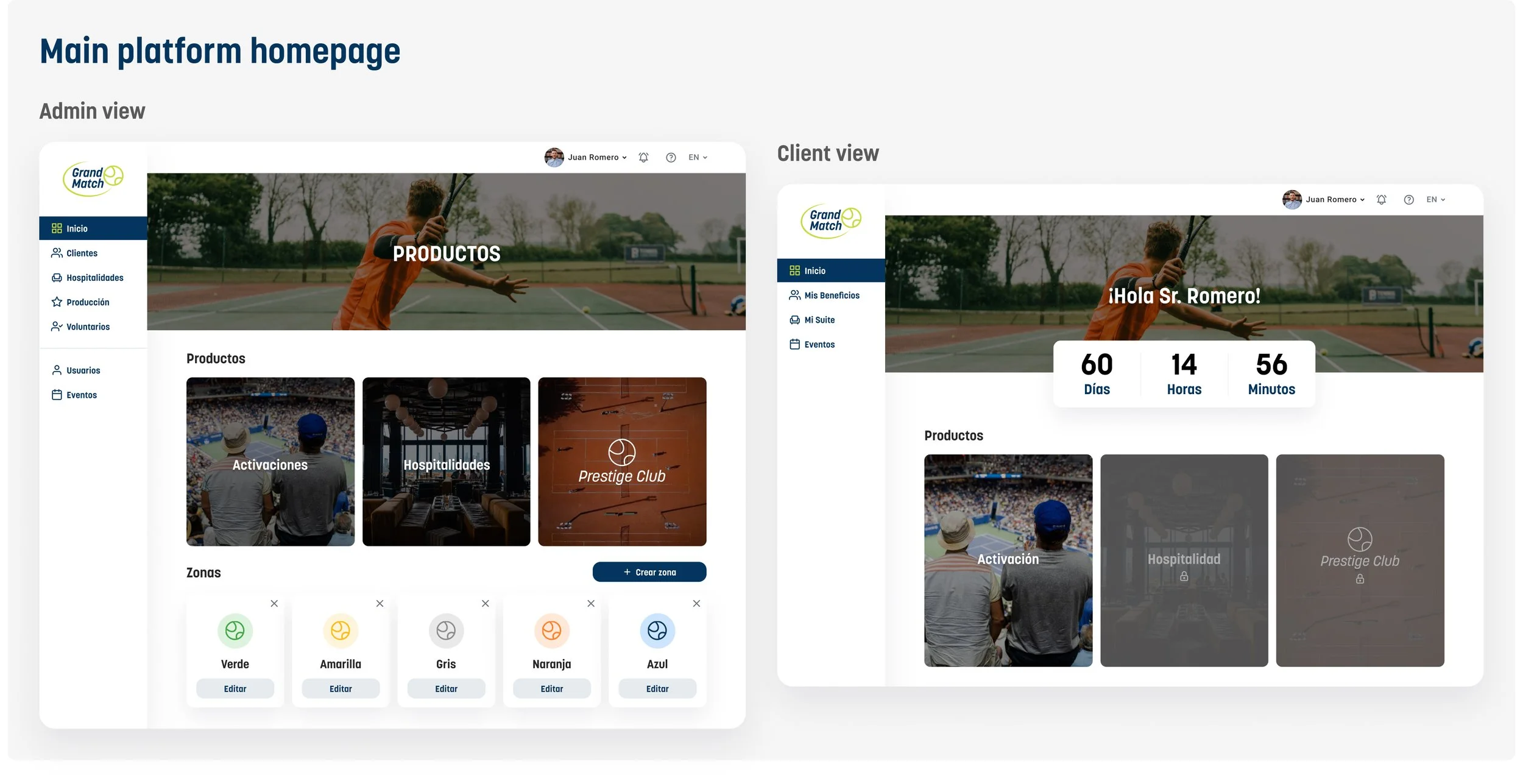Grand Match
A comprehensive interface that meets the needs of both managers and attendees of a tennis tournament.
Grand Match is designed to allow event managers to efficiently manage reservations, logistics and the volunteer selection process for the event, while allowing attendees to easily customise their purchased spaces and services.
This project presented us with several unique challenges due to the complexity of the platform:
The company was not systematized, everything was done externally through Excel, email, and other documents that were not unified, which made the processes inefficient.
There was a defined process, but it was not followed. Communication between different areas (commercial, hospitality and production) was lost.
Company with +200 people working together. Company that hires people on a temporary basis while the event lasts, resulting in a deep lack of knowledge of processes, interactions and areas.
Company that historically is not very technological, so one of the biggest challenges was to make a process of digital transformation and change management.
The flows were extremely complex and long, with different rules for each situation and interaction, and different negotiations depending on the type of customer.
The number of people involved in the project and in the use of the platform, the different roles of the users, their very different ages and approaches to technology.
For the Administrator User:
Space Management: It should be easy for the administrator to add, edit and delete available spaces, as well as configure availability and pricing.
Additional Services Management: It should allow the administration of additional services, such as catering or rental of services and equipment, etc.
Purchase Tracking: The administrator should be able to view and manage all purchases and reservations of spaces, with full details and ability to communicate with customers.
Customer Communication: A messaging system to answer questions and address customer requests.
For the Client User:
Simple Customization: The platform should be intuitive and easy to use, allowing the client to customize their space and select additional services quickly and easily.
Clear Information: It should provide detailed information on available spaces, additional services, prices and schedules.
Efficient Booking Process: The booking process should be clear and efficient, with immediate confirmations and secure payment options.
Communication: Must offer a direct communication channel with the administrator for inquiries and special requests.
Reservation History: Customers should have access to a history of their reservations and the ability to make modifications if necessary.
For Derived Platforms:
Efficient Management: Both administrators and clients of derivative platforms should experience streamlined management processes for exclusive space rental and volunteer recruitment, respectively.
Communication: Derived platforms should provide effective communication channels between administrators and users.
Systematize everything in a single platform. Design an interface that effectively organizes and presents complex data in an understandable and user-friendly way, catering to different user roles while maintaining usability, functionality, security and privacy.
Provide intuitive features to enhance user experience and effective channels for communication and feedback between the different user roles is essential.
Collaborate closely with tournament organizers and stakeholders to understand their specific requirements, needs and constraints.
To map and unify all the complex and lengthy processes within the platform in a much simpler, easier, more intuitive and user-friendly way for the different types of users, thus giving the platform the green light when it is presented to the stakeholders.
Derivative Platforms
Based on the main platform, two platforms were fully designed as well. The first one for a more premium venue experience and the second one for volunteer recruitment for the event. Both also with administrator and client/volunteer views.
The platform successfully meets its objectives of providing an optimal user experience for both parties. Clients can easily customize their spaces and services, while administrators can efficiently manage bookings and logistics.
The derivative platforms, designed for exclusive space rental and volunteer recruitment, follow the same philosophy of providing simplified management and effective communication. Together, these platforms contribute to the efficiency and overall success of the tennis event, meeting the needs of all involved.
The key to success is a well-designed UX and intuitive user interface across all platforms.











